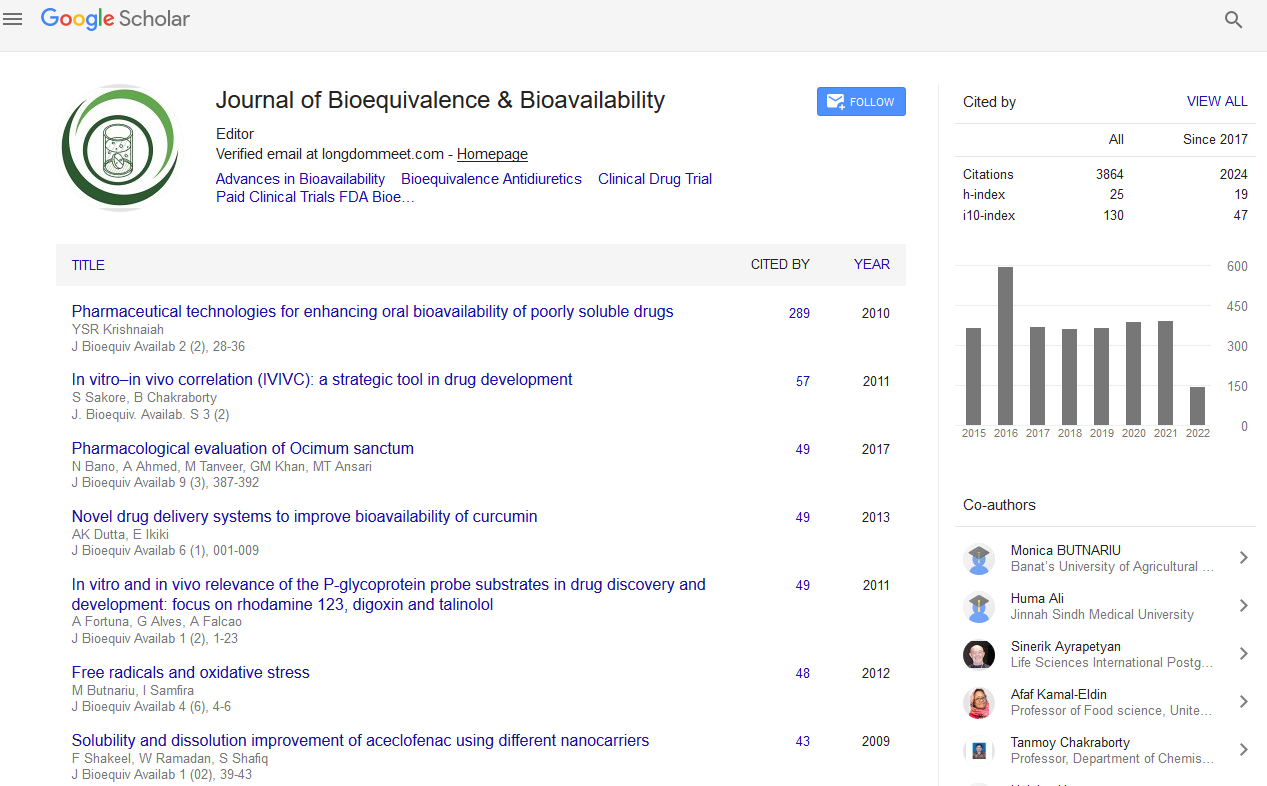PMC/PubMed Indexed Articles
Indexed In
- Academic Journals Database
- Open J Gate
- Genamics JournalSeek
- Academic Keys
- JournalTOCs
- China National Knowledge Infrastructure (CNKI)
- CiteFactor
- Scimago
- Ulrich's Periodicals Directory
- Electronic Journals Library
- RefSeek
- Hamdard University
- EBSCO A-Z
- OCLC- WorldCat
- SWB online catalog
- Virtual Library of Biology (vifabio)
- Publons
- MIAR
- University Grants Commission
- Geneva Foundation for Medical Education and Research
- Euro Pub
- Google Scholar
Useful Links
Share This Page
Journal Flyer

Open Access Journals
- Agri and Aquaculture
- Biochemistry
- Bioinformatics & Systems Biology
- Business & Management
- Chemistry
- Clinical Sciences
- Engineering
- Food & Nutrition
- General Science
- Genetics & Molecular Biology
- Immunology & Microbiology
- Medical Sciences
- Neuroscience & Psychology
- Nursing & Health Care
- Pharmaceutical Sciences
Updates on US-FDA?s bioequivalence approaches for generic drug products
4th World Congress on Bioavailability and Bioequivalence: Pharmaceutical R&D Summit
May 20-22, 2013 DoubleTree by Hilton, Beijing, China
Xiaojian Jiang
AcceptedAbstracts: J Bioequiv Availab
Abstract:
Bioequivalence studies are clinical trials submitted in an Abbreviated New Drug Application (ANDA) to demonstrate that the generic and innovator drug products do not differ significantly in the rate and extent to which the active ingredient or moiety becomes available at the site of action. For systemically active drug products, the AUCt , AUC∞ and Cmax of the drug plasma concentration profiles are compared statistically to determine whether two products are bioequivalent. This presentation will focus on the currently implemented BE approaches for locally acting drug products, the biowaiver based the Biopharmaceutics Classification system (BCS), the reference-scaled average bioequivalence approach (RSABE) for highly variable (HV) drugs products, the new ?all BE studies? rule and some recommendations for improving BE data quality. For locally-acting drug products, since plasma concentrations may not reflect drug availability at the site of action, the in vivo pharmacodynamic (PD) studies, in vivo clinical endpoint studies and in vitro BE studies, as well as the combined in vivo and in vitro approaches may be used to demonstrate BE for this type of drug products. The FDA implemented guidance for industry describing how to obtain biowaivers for BCS Class I drugs. This presentation will review the appropriate studies and documentation regarding high solubility, high permeability and rapid dissolution. Over the past decade, concerns have been expressed regarding the difficulty of meeting the standard bioequivalence (BE) criteria for highly variable (HV) drugs products (within-subject variability greater than 30%) using a reasonable number of study subjects. The FDA-developed RSABE approach scaled the BE acceptance limits to the variability of the reference product. The RSABE study design, comparison statistic, and the BE acceptance criteria will be elaborated in this talk. The FDA has implemented new requirements for submission of all BE studies in July 9, 2009. This presentation will summarize the reasons for adding this rule to FDA?s regulation, the Draft Guidance detailed the format and the types of formulations to be submitted, and the statistics of the failed studies. At last, some of the common BE deficiencies, ANDA organization issues and bioanalytical issues will be shared with the Chinese pharmaceutical industry for the purpose of helping improve the quality of the BE submission and expedite the generic drug review process.
Biography :
Dr. Xiaojian Jiang is currently serving as the Team Leader of the Division of Bioequivalence II, in the Office of Generic Drugs, CDER, FDA. As such, Xiaojian supervises, manages and oversees the Team 7 review of clinical bioequivalence trial data submitted to Abbreviated New Drug Applications for marketing approval of new generic drug products pertaining to locally-acting Gastrointestinal (GI) drugs, Antibiotics, Anti-Parkinson drug products, etc. Since March 2009, Xiaojian has led the review team 7 on developing novel BE approaches for evaluating challenging locally acting GI drugs including vancomycin capsules, mesalamine oral products, orlistat capsules using in vitro BE study method and pharmacodynamic endpoint study. Xiaojian joined the Division of Bioequivalence in 2003. As a Senior Pharmacology Reviewer in the Division of Bioequivalence, she successfully reviewed numerous ANDAs, amendment, supplements, protocols, control documents and DSI inspection reports. Throughout this year, she has developed in-depth understanding and expertise in the area of BE approaches and generic drug approval process. She also made significant contributions to several guidance developments and various FDA working groups to resolve complex regulatory issues. From Nov. 2007 to Feb. 2009, she served as a dissolution expert in the DB. Her primary role was to provide consultation to DB reviewers pertaining to complicated in vitro dissolution issues. She has received several FDA and CDER awards due to her outstanding quality work and significant contributions to the FDA and CDER initiatives. She also had multiple presentations and publications in the area of BE approaches for locally acting drug products, issues related to the highly variable drug products, in vitro dissolution testing, in vitro BE approach for Nasal Spray Product, and metabolite determination in BE studies, etc. Xiaojian received his Ph.D. in Pharmaceutical Sciences from the University of Maryland, Baltimore. Her thesis work focused on developing of a Novel Liquid Sustained-Release Drug Delivery System for Water-soluble Drugs. She had two Patents related to her thesis work.


